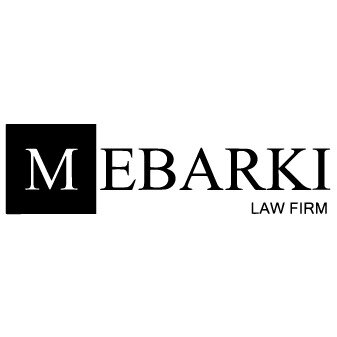Best Family Lawyers in Algeria
Share your needs with us, get contacted by law firms.
Free. Takes 2 min.
Free Guide to Hiring a Family Lawyer
Or refine your search by selecting a city:
List of the best lawyers in Algeria
About Family Law in Algeria
Family law in Algeria governs legal matters related to family relationships, such as marriage, divorce, child custody, and inheritance. The legal system in Algeria is based on Islamic law, which influences the family law in the country.
Why You May Need a Lawyer
There are several situations where you may need a lawyer for family matters in Algeria, such as divorce, child custody disputes, adoption, inheritance disputes, and domestic violence cases. A lawyer can help you navigate the legal system, understand your rights, and advocate for your best interests.
Local Laws Overview
In Algeria, family law is governed by the Family Code, which provides rules and regulations regarding marriage, divorce, child custody, adoption, and inheritance. The Family Code is based on Islamic law, and certain aspects of family law may vary based on religious beliefs and cultural practices.
Frequently Asked Questions
Q: What are the requirements for marriage in Algeria?
A: In Algeria, both parties must be at least 19 years old to marry. A marriage contract must be signed in the presence of two witnesses, and the couple must register their marriage with the local authorities.
Q: How is child custody decided in Algeria?
A: Child custody is typically awarded to the mother in Algeria, with the father providing financial support. However, custody arrangements may vary based on the best interests of the child.
Q: How does divorce work in Algeria?
A: In Algeria, divorce can be obtained through mutual consent or through court proceedings. Grounds for divorce include adultery, cruelty, and abandonment. The court may also consider the welfare of any children involved in the divorce.
Q: What are the inheritance laws in Algeria?
A: In Algeria, Islamic law governs inheritance, with male heirs typically receiving double the share of female heirs. However, there are provisions in place to ensure fair distribution of inheritance among all heirs.
Q: How can I adopt a child in Algeria?
A: Adoption laws in Algeria are complex and may vary based on the religious beliefs of the parties involved. It is recommended to consult with a lawyer who specializes in family law to navigate the adoption process.
Q: What legal protections are available for victims of domestic violence in Algeria?
A: Victims of domestic violence in Algeria can seek protection through the court system by obtaining a restraining order against the abuser. Legal assistance is recommended to ensure the safety and well-being of the victim.
Q: Can a woman in Algeria initiate divorce proceedings?
A: Yes, women in Algeria have the right to initiate divorce proceedings through the court system. Legal assistance can help women understand their rights and navigate the divorce process effectively.
Q: What are the rights of unmarried couples in Algeria?
A: Unmarried couples in Algeria do not have the same legal rights as married couples. It is recommended to consult with a lawyer to understand the legal implications of cohabitation and property ownership for unmarried couples.
Q: How can I challenge a will in Algeria?
A: If you believe that a will in Algeria is invalid or unfair, you can challenge it through the court system. Legal assistance is recommended to navigate the probate process and protect your inheritance rights.
Q: What are the legal consequences of not paying child support in Algeria?
A: Failure to pay child support in Algeria can result in legal consequences, such as fines, imprisonment, and loss of parental rights. It is important to fulfill your financial obligations to support your children.
Additional Resources
For additional information and resources related to family law in Algeria, you can contact the Ministry of Justice, the National Bar Association, or legal aid organizations in your area. These resources can provide guidance and support for individuals in need of legal assistance.
Next Steps
If you require legal assistance for family matters in Algeria, it is important to consult with a qualified lawyer who specializes in family law. A lawyer can provide personalized advice, represent you in court proceedings, and help you navigate the complexities of the legal system. Research local law firms and schedule a consultation to discuss your case and explore your legal options.
Lawzana helps you find the best lawyers and law firms in Algeria through a curated and pre-screened list of qualified legal professionals. Our platform offers rankings and detailed profiles of attorneys and law firms, allowing you to compare based on practice areas, including Family, experience, and client feedback.
Each profile includes a description of the firm's areas of practice, client reviews, team members and partners, year of establishment, spoken languages, office locations, contact information, social media presence, and any published articles or resources. Most firms on our platform speak English and are experienced in both local and international legal matters.
Get a quote from top-rated law firms in Algeria — quickly, securely, and without unnecessary hassle.
Disclaimer:
The information provided on this page is for general informational purposes only and does not constitute legal advice. While we strive to ensure the accuracy and relevance of the content, legal information may change over time, and interpretations of the law can vary. You should always consult with a qualified legal professional for advice specific to your situation.
We disclaim all liability for actions taken or not taken based on the content of this page. If you believe any information is incorrect or outdated, please contact us, and we will review and update it where appropriate.
Browse family law firms by service in Algeria
Algeria Attorneys in related practice areas.
Browse family law firms by city in Algeria
Refine your search by selecting a city.











